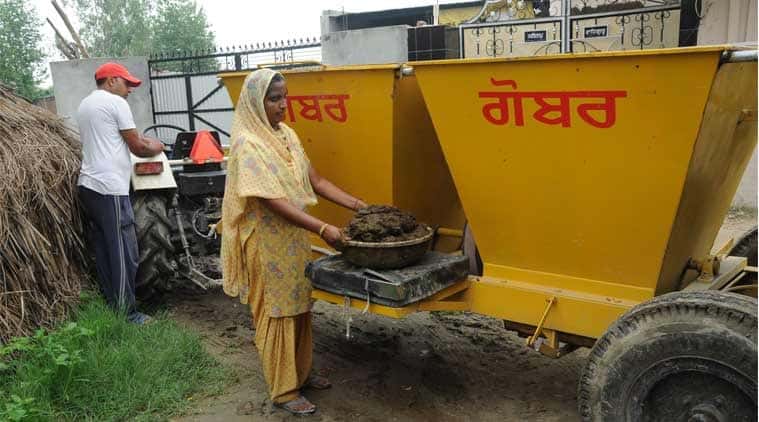
Banas Dairy Procures Cow Dung from Farmers for Rs 1/kg for New Biogas Plant
AHMEDABAD — A group of farmers in Banaskantha district in Gujarat have started earning Rs 1 for every kilogram of cow dung they are supplying to Banas Dairy for feeding a biogas plant that can supply CNG as fuel to 100 vehicles a day. The newly built biogas plant, an initiative by the Banas Dairy, has a capacity to treat 40 tonnes of cow dung which is collected daily from 254 farmers of 12 villages in Dama which is near Deesa in Banaskantha district. These 254 farmers also supply milk to Banas Dairy and selling cow dung will provide them an additional source of income. “We have started procuring cattle dung on a daily basis from farmers like the way we procure milk. We are paying Rs 1 to the farmers for every kilogram of cow dung. We are making biogas out of this dung which is then purified into CNG. The plant is based on German technology and is one of the biggest plants in India,” said Shankar Chaudhary, chairman of Banas Dairy that describes itself as “Asia’s biggest milk producer”.
“We have made a 100-member team consisting graduates from the Indian Institute of Technology (IIT), Indian Institute of Management (IIM), Banaras Hindu University (BHU), and Institute of Rural Management, Anand (IRMA) to work on this project,” said Chaudhary who is also a senior BJP leader.
The Banas Dairy procures milk from these villages and also has an idea of the number of cattle each farmer owns. In the morning, tractors equipped with weighing scales visit each farmer and collect cow dung after weighing them. These tractors make 14-15 trips daily to the biogas plant. “The money is transferred to their bank accounts in 15 days like the way we do it for the milk procured from them. We began collecting cow dung from May 20 and we have already paid more than Rs 7 lakh to the farmers,” says Priyank Mehta, executive engineer working on this project.
The Banas Dairy had begun the project in February but had to shut it down due to the Covid-19 pandemic. “We restarted it only in May. Usually, the methane emanated from cow dung disperses into the atmosphere and harms it. Our attempt through this project is to tap it and convert it into fuel,” Mehta said.
Once the cow dung reaches the biogas plant, it is mixed with water in 1:1 ratio for two-three hours and then fed into a digester which is a closed tank where the mixture is kept for 35 days in absence of oxygen. Then the liquid and solid part of this mixture is separated and are used as fertilizers. Meanwhile, the gas emanated from the digester is collected in large balloon- shaped tanks. This gas is purified in a plant where carbon dioxide, hydrogen sulphide and other gases are removed. About 95-97 per cent of the remaining gas will be methane. This gas is then compressed and sold as CNG.
“We do not transport it as our dispenser which can feed 100 vehicles a day is just 50 meters away from the biogas plant,” Mehta added.
Banas Dairy chairman Shankar Chaudhary said that the biogas plant was ready to dispense CNG and will be inaugurated in the coming weeks. “We are also researching to see if tractors could be run using this CNG. This could turn out to be a boon for this region where the main source of income is agriculture,” he added.
Read: Voluntary Wait Period – Critical to Maintain Breeding Cycle
Source: The article is extracted from The Indian Express, July 25, 2020.
